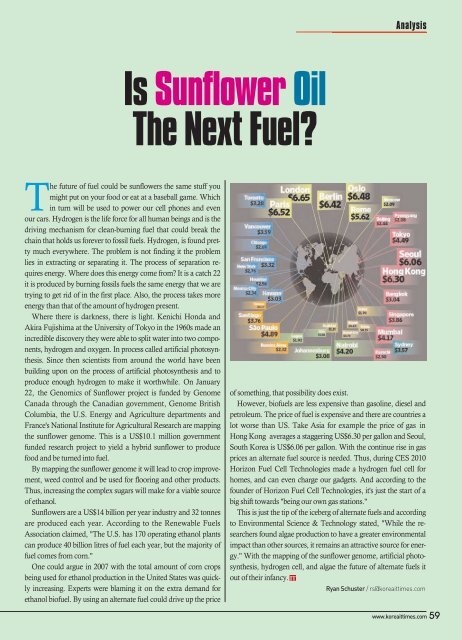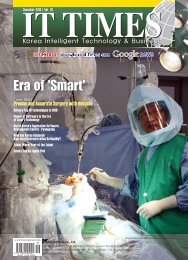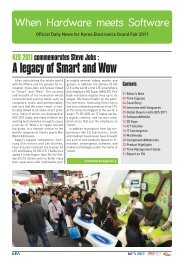is Coming to Korea - Korea IT Times
is Coming to Korea - Korea IT Times
is Coming to Korea - Korea IT Times
Create successful ePaper yourself
Turn your PDF publications into a flip-book with our unique Google optimized e-Paper software.
Analys<strong>is</strong><br />
Is Sunflower Oil<br />
The Next Fuel?<br />
The future of fuel could be sunflowers the same stuff you<br />
might put on your food or eat at a baseball game. Which<br />
in turn will be used <strong>to</strong> power our cell phones and even<br />
our cars. Hydrogen <strong>is</strong> the life force for all human beings and <strong>is</strong> the<br />
driving mechan<strong>is</strong>m for clean-burning fuel that could break the<br />
chain that holds us forever <strong>to</strong> fossil fuels. Hydrogen, <strong>is</strong> found pretty<br />
much everywhere. The problem <strong>is</strong> not finding it the problem<br />
lies in extracting or separating it. The process of separation requires<br />
energy. Where does th<strong>is</strong> energy come from? It <strong>is</strong> a catch 22<br />
it <strong>is</strong> produced by burning fossils fuels the same energy that we are<br />
trying <strong>to</strong> get rid of in the first place. Also, the process takes more<br />
energy than that of the amount of hydrogen present.<br />
Where there <strong>is</strong> darkness, there <strong>is</strong> light. Kenichi Honda and<br />
Akira Fuj<strong>is</strong>hima at the University of Tokyo in the 1960s made an<br />
incredible d<strong>is</strong>covery they were able <strong>to</strong> split water in<strong>to</strong> two components,<br />
hydrogen and oxygen. In process called artificial pho<strong>to</strong>synthes<strong>is</strong>.<br />
Since then scient<strong>is</strong>ts from around the world have been<br />
building upon on the process of artificial pho<strong>to</strong>synthes<strong>is</strong> and <strong>to</strong><br />
produce enough hydrogen <strong>to</strong> make it worthwhile. On January<br />
22, the Genomics of Sunflower project <strong>is</strong> funded by Genome<br />
Canada through the Canadian government, Genome Brit<strong>is</strong>h<br />
Columbia, the U.S. Energy and Agriculture departments and<br />
France's National Institute for Agricultural Research are mapping<br />
the sunflower genome. Th<strong>is</strong> <strong>is</strong> a US$10.1 million government<br />
funded research project <strong>to</strong> yield a hybrid sunflower <strong>to</strong> produce<br />
food and be turned in<strong>to</strong> fuel.<br />
By mapping the sunflower genome it will lead <strong>to</strong> crop improvement,<br />
weed control and be used for flooring and other products.<br />
Thus, increasing the complex sugars will make for a viable source<br />
of ethanol.<br />
Sunflowers are a US$14 billion per year industry and 32 <strong>to</strong>nnes<br />
are produced each year. According <strong>to</strong> the Renewable Fuels<br />
Association claimed, "The U.S. has 170 operating ethanol plants<br />
can produce 40 billion litres of fuel each year, but the majority of<br />
fuel comes from corn."<br />
One could argue in 2007 with the <strong>to</strong>tal amount of corn crops<br />
being used for ethanol production in the United States was quickly<br />
increasing. Experts were blaming it on the extra demand for<br />
ethanol biofuel. By using an alternate fuel could drive up the price<br />
of something, that possibility does ex<strong>is</strong>t.<br />
However, biofuels are less expensive than gasoline, diesel and<br />
petroleum. The price of fuel <strong>is</strong> expensive and there are countries a<br />
lot worse than US. Take Asia for example the price of gas in<br />
Hong Kong averages a staggering US$6.30 per gallon and Seoul,<br />
South <strong>Korea</strong> <strong>is</strong> US$6.06 per gallon. With the continue r<strong>is</strong>e in gas<br />
prices an alternate fuel source <strong>is</strong> needed. Thus, during CES 2010<br />
Horizon Fuel Cell Technologies made a hydrogen fuel cell for<br />
homes, and can even charge our gadgets. And according <strong>to</strong> the<br />
founder of Horizon Fuel Cell Technologies, it's just the start of a<br />
big shift <strong>to</strong>wards "being our own gas stations."<br />
Th<strong>is</strong> <strong>is</strong> just the tip of the iceberg of alternate fuels and according<br />
<strong>to</strong> Environmental Science & Technology stated, "While the researchers<br />
found algae production <strong>to</strong> have a greater environmental<br />
impact than other sources, it remains an attractive source for energy."<br />
With the mapping of the sunflower genome, artificial pho<strong>to</strong>synthes<strong>is</strong>,<br />
hydrogen cell, and algae the future of alternate fuels it<br />
out of their infancy.<br />
Ryan Schuster / rs@koreaittimes.com<br />
www.koreaittimes.com 59

















